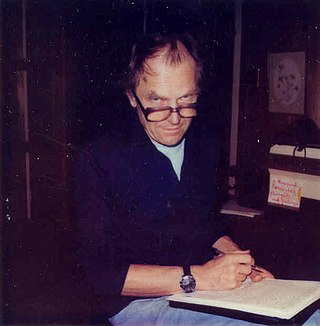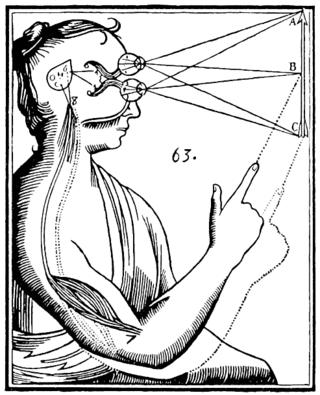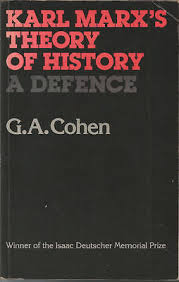Intelligent design (ID) is a pseudoscientific argument for the existence of God, presented by its proponents as "an evidence-based scientific theory about life's origins". Proponents claim that "certain features of the universe and of living things are best explained by an intelligent cause, not an undirected process such as natural selection." ID is a form of creationism that lacks empirical support and offers no testable or tenable hypotheses, and is therefore not science. The leading proponents of ID are associated with the Discovery Institute, a Christian, politically conservative think tank based in the United States.
Materialism is a form of philosophical monism which holds matter to be the fundamental substance in nature, and all things, including mental states and consciousness, are results of material interactions of material things. According to philosophical materialism, mind and consciousness are by-products or epiphenomena of material processes, without which they cannot exist. This concept directly contrasts with idealism, where mind and consciousness are first-order realities to which matter is dependent while material interactions are secondary.

The relationship between religion and science involves discussions that interconnect the study of the natural world, history, philosophy, and theology. Even though the ancient and medieval worlds did not have conceptions resembling the modern understandings of "science" or of "religion", certain elements of modern ideas on the subject recur throughout history. The pair-structured phrases "religion and science" and "science and religion" first emerged in the literature during the 19th century. This coincided with the refining of "science" and of "religion" as distinct concepts in the preceding few centuries—partly due to professionalization of the sciences, the Protestant Reformation, colonization, and globalization. Since then the relationship between science and religion has been characterized in terms of "conflict", "harmony", "complexity", and "mutual independence", among others.
Dialectic, also known as the dialectical method, is a discourse between two or more people holding different points of view about a subject but wishing to establish the truth through reasoned argumentation. Dialectic resembles debate, but the concept excludes subjective elements such as emotional appeal and rhetoric. Dialectic may thus be contrasted with both the eristic, which refers to argument that aims to successfully dispute another's argument, and the didactic method, wherein one side of the conversation teaches the other. Dialectic is alternatively known as minor logic, as opposed to major logic or critique.

Paul Karl Feyerabend was an Austrian philosopher best known for his work in the philosophy of science. He started his academic career as lecturer in the philosophy of science at the University of Bristol (1955–1958); afterwards, he moved to the University of California, Berkeley, where he taught for three decades (1958–1989). At various points in his life, he held joint appointments at the University College London (1967–1970), the London School of Economics (1967), the FU Berlin (1968), Yale University (1969), the University of Auckland, the University of Sussex (1974), and, finally, the ETH Zurich (1980–1990). He gave lecture series at Stanford University (1967), the University of Kassel (1977) and the University of Trento (1992).
Scientism is the opinion that science and the scientific method are the best or only way to render truth about the world and reality.
Vitalism is a belief that starts from the premise that "living organisms are fundamentally different from non-living entities because they contain some non-physical element or are governed by different principles than are inanimate things." Where vitalism explicitly invokes a vital principle, that element is often referred to as the "vital spark," "energy," or "élan vital," which some equate with the soul. In the 18th and 19th centuries vitalism was discussed among biologists, between those who felt that the known mechanics of physics would eventually explain the difference between life and non-life and vitalists who argued that the processes of life could not be reduced to a mechanistic process. Vitalist biologists such as Johannes Reinke proposed testable hypotheses meant to show inadequacies with mechanistic explanations, but their experiments failed to provide support for vitalism. Biologists now consider vitalism in this sense to have been refuted by empirical evidence, and hence regard it either as a superseded scientific theory, or, since the mid-20th century, as a pseudoscience.

In the philosophy of mind, mind–body dualism denotes either the view that mental phenomena are non-physical, or that the mind and body are distinct and separable. Thus, it encompasses a set of views about the relationship between mind and matter, as well as between subject and object, and is contrasted with other positions, such as physicalism and enactivism, in the mind–body problem.

The Wedge Strategy is a creationist political and social action plan authored by the Discovery Institute, the hub of the pseudoscientific intelligent design movement. The strategy was put forth in a Discovery Institute manifesto known as the Wedge Document. Its goal is to change American culture by shaping public policy to reflect politically conservative fundamentalist evangelical Protestant values. The wedge metaphor is attributed to Phillip E. Johnson and depicts a metal wedge splitting a log.

Positivism is an empiricist philosophical theory that holds that all genuine knowledge is either true by definition or positive—meaning a posteriori facts derived by reason and logic from sensory experience. Other ways of knowing, such as theology, metaphysics, intuition, or introspection, are rejected or considered meaningless.

Neo-creationism is a pseudoscientific movement which aims to restate creationism in terms more likely to be well received by the public, by policy makers, by educators and by the scientific community. It aims to re-frame the debate over the origins of life in non-religious terms and without appeals to scripture. This comes in response to the 1987 ruling by the United States Supreme Court in Edwards v. Aguillard that creationism is an inherently religious concept and that advocating it as correct or accurate in public-school curricula violates the Establishment Clause of the First Amendment.
Metaphysical naturalism is a philosophical worldview which holds that there is nothing but natural elements, principles, and relations of the kind studied by the natural sciences. Methodological naturalism is a philosophical basis for science, for which metaphysical naturalism provides only one possible ontological foundation. Broadly, the corresponding theological perspective is religious naturalism or spiritual naturalism. More specifically, metaphysical naturalism rejects the supernatural concepts and explanations that are part of many religions.

The level of support for evolution among scientists, the public, and other groups is a topic that frequently arises in the creation–evolution controversy, and touches on educational, religious, philosophical, scientific, and political issues. The subject is especially contentious in countries where significant levels of non-acceptance of evolution by the general population exists, but evolution is taught at public schools and universities.

Climate change denial, or global warming denial, is denial, dismissal, or unwarranted doubt that contradicts the scientific consensus on climate change, including the extent to which it is caused by humans, its effects on nature and human society, or the potential of adaptation to global warming by human actions. Many who deny, dismiss, or hold unwarranted doubt about the scientific consensus on anthropogenic global warming self-label as "climate change skeptics", which several scientists have noted is an inaccurate description. Climate change denial can also be implicit when individuals or social groups accept the science but fail to come to terms with it or to translate their acceptance into action. Several social science studies have analyzed these positions as forms of denial or denialism, pseudoscience, or propaganda.

Karl Marx's Theory of History: A Defence is a 1978 book by the philosopher G. A. Cohen, the culmination of his attempts to reformulate Karl Marx's doctrines of alienation, exploitation, and historical materialism. Cohen, who interprets Marxism as a scientific theory of history, applies the techniques of analytic philosophy to the elucidation and defence of Marx's materialist conception of history.
Marxist–Leninist atheism, also known as Marxist–Leninist scientific atheism, was the state atheist and antireligious element of the former Soviet Union before the extensive glasnost reforms of Mikhail Gorbachev. Under Bolshevism, this was a variant of Marxism–Leninism, the official communist state ideology of the Soviet Union. Based upon a dialectical-materialist understanding of humanity's place in nature, Marxist–Leninist atheism proposes that religion is the opium of the people; thus, Soviet Marxism–Leninism advocates "scientific atheism", rather than religious belief.

In philosophy, naturalism is the idea or belief that only natural laws and forces operate in the universe.
Dialectical materialism is a materialist theory based upon the writings of Karl Marx and Friedrich Engels that has found widespread applications in a variety of philosophical disciplines ranging from philosophy of history to philosophy of science. As a materialist philosophy, Marxist dialectics emphasizes the importance of real-world conditions and the presence of functional contradictions within and among social relations, which derive from, but are not limited to the contradictions that occur in social class, labour economics, and socioeconomic interactions.
Historical materialism is Karl Marx's theory of history. Marx locates historical change in the rise of class societies and the way humans labor together to make their livelihoods. For Marx and his lifetime collaborator, Friedrich Engels, the ultimate cause and moving power of historical events are to be found in the economic development of society and the social and political upheavals wrought by changes to the mode of production. Historical materialism provides a challenge to the view that historical processes have come to a close and that capitalism is the end of history. Although Marx never brought together a formal or comprehensive description of historical materialism in one published work, his key ideas are woven into a variety of works from the 1840s onward. Since Marx's time, the theory has been modified and expanded. It now has many Marxist and non-Marxist variants.
The term queer ecology refers to a perspective which views nature, biology, and sexuality through the lens of queer theory. It objects to what it considers heterosexist notions of nature, drawing from science studies, ecofeminism, environmental justice, and queer geography. This perspective breaks apart various "dualisms" that exist within human understanding of nature and culture.









